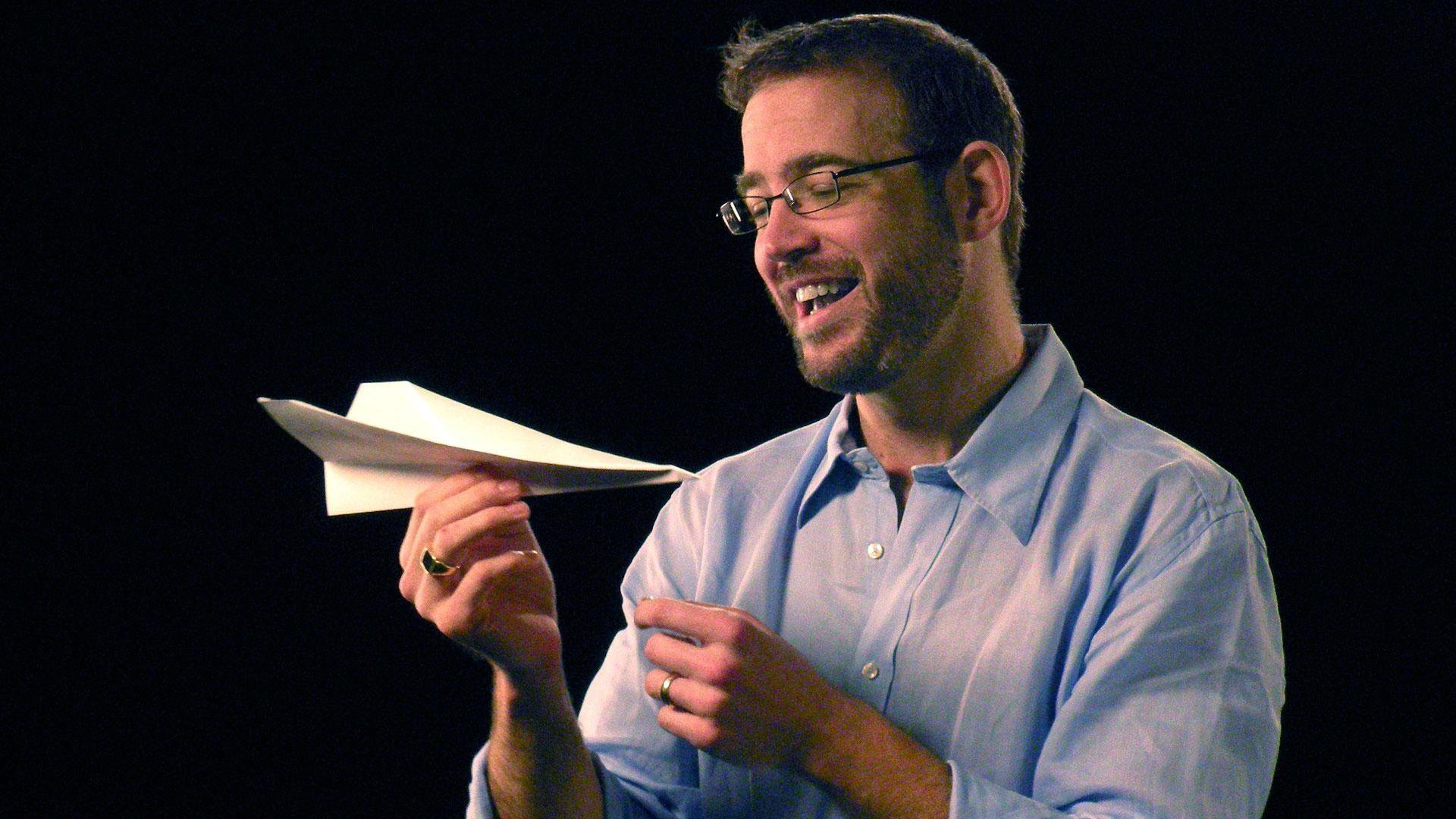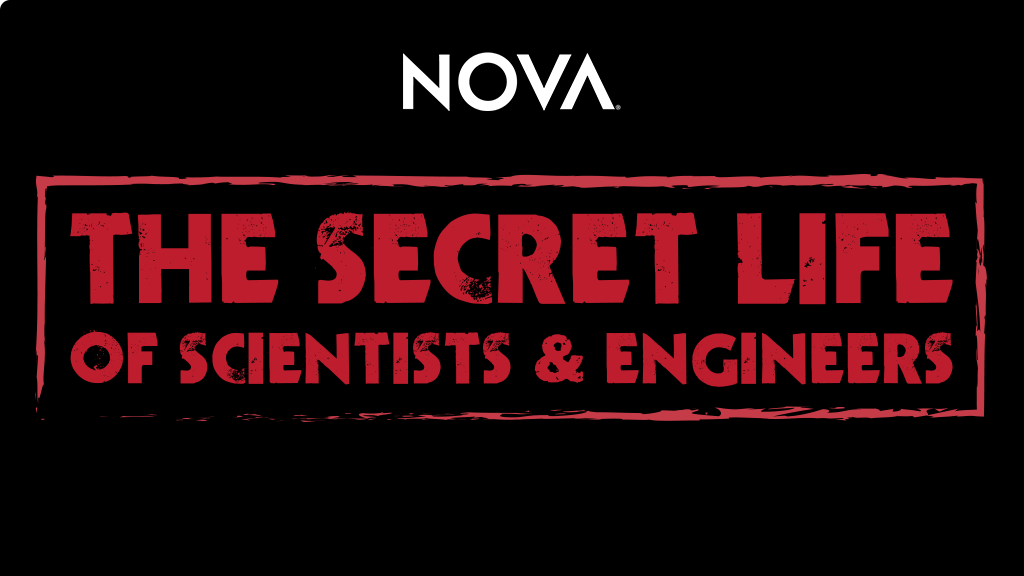Allan Adams
Allan is a string theorist and MIT professor who studies particle physics, gravity, and everything in between.

Meet string theorist and MIT professor Allan Adams in these videos, blog posts, and interviews from NOVA's "The Secret Life of Scientists & Engineers." He studies particle physics, gravity, and everything in between. When not contemplating the universe, Allan can most often be found piloting glider planes.
“You can make beautiful things starting with simple ingredients.”
Science:
Allan Adams is a theoretical physicist. String is his theory of choice, and he uses it to study the history of the universe.
Secret:
Allan is a glider plane pilot, meaning that he joyfully glides in planes with no engines.
Making Waves
Allan Adams enthuses about waves, a simple phenomenon at the root of almost everything.
Searching for Lift
Allan Adams learns how not to fall from the sky in a glider plane.
30 Second Science with Allan Adams
We give Allan Adams 30 seconds to describe his science and he tries to explain the history of the universe.
10 Questions for Allan Adams
We ask Allan Adams 10 questions and he tells us he makes lots of mistakes.
Beneath the surface
I took physics back in my college days, but it was definitely the “for poets” version—you know, greatly simplified so that we poet types could learn a little physics without risk of our heads exploding. Now I love to read about physics and even more so, to hear physicists explain the world to me in the comfort of the magnificent “Secret Life” studios. Still, I have to admit that my eyes do glaze over when faced with an equation more complicated than peanut butter + chocolate = happiness. My attitude can be summarized thusly: Tell me about it, but don’t make me do the math.
And so we come to Allan Adams.
Allan is so enthusiastic about physics (and everything else that he loves) that it’s pretty much impossible to not jump onto whatever ship—or glider plane—he happens to be piloting at the moment. He explained to us during his interview that “the equations [in physics] are a way of telling a story and giving a description to some complicated phenomena that are beautiful.”
But it wasn’t until Allan gave me a concrete example that it really made sense to me:
“You know, you sit on a surfboard looking out into the ocean, and you watch sets of waves come in. And you might think that it’s weird that the waves seem to die out before they get to me. But there’s a beautiful explanation for that, and it’s encoded in an equation. And you look at the equation, and the equation isn’t very interesting. But it’s telling you that when you’re out on the surfboard, wait a little while. Wait till a few waves have gone by. That’s when you’ll catch a really good wave. So physics is not telling you some set of equations. It’s telling you about sitting on a surfboard, catching waves in the ocean. And the most important thing in studying physics and in coming to physics is seeing the difference there, not getting distracted by the equations on the surface, but reading the story that’s encoded.”
The equations tell a story. Just like sheet music can never actually be a sonata or an opera or even a Lady Gaga tune, so too the equations aren’t the thing itself, but the language that gets us to the thing itself. So I understood Allan to be saying this—learn about the equations on the surface, understand them, but always keep in mind that the surface is only there so we can go beneath the surface.
And surfing is a pretty great way to do that.
It’s a message even a poet can understand.
Ask Allan your questions
We called all glider pilots, surfers, physicists, and those who are interested in any of these fields of endeavor. Allan took a break from the sky to answer your questions.
Q: Jim Chappell
A question that has puzzled me for a long time. If a black hole composed of “ordinary” matter coalesced with a black hole derived from “anti-matter” would there be any observable difference from the case of two “ordinary” matter black holes combining?
A: Allan Adams
That’s a deep question. In general relativity, the answer is a resounding “no!” in fact, this is elevated to a mathematical theorem called, no kidding, the “no hair theorem”, which says that two black holes with the same mass but built out of different stuff are perfectly indistinguishable (you can’t tell them apart by how they comb their hair — they’re all bald). This isn’t just a good idea, it’s a law! So can you tell whether a black hole was built by collapsing atoms or anti-atoms? By the "no hair theorem," no!
Quantum mechanics, however, throws a wrench in the gears. One of the most basic postulates of quantum mechanics is that information does not just disappear. This is called “unitarity” for technical reasons, but we might as well call it “unforgetfulness”. Again, this isn’t just a good idea, it’s a fundamental law without which the universe would look nothing like the world around us. To physicists, "unforgetfulness" is as close to bedrock as theory ever gets. and what it says is that the universe can’t possibly forget that we built our black hole out of matter rather than anti-matter, so we must be able to tell the difference.
This conflict is one of the deepest problems in physics. "Unforgetfulness" is a well-demonstrated observed fact about the world and lies at the heart of quantum mechanics. the no-hair theorem is a mathematical fact in general relativity, a theory which is also fabulously well tested (eg, the gps in your phone would never work without including corrections form general relativity). and they directly disagree! so what are we supposed to believe?
The short answer is this: general relativity is wrong. Mind you, it’s not stupid — it fits all the data we have, in every regime where we’ve ever tested it, so it’s clearly right about those things. more precisely, it’s an excellent description in many contexts. But it’s not a reliable description in every context — in particular, when quantum effects and gravity are both important, we know from the above that general relativity must not tell the whole story. hence physicists’ interest in understanding quantum gravity.
Sadly, building experiments where both gravity and quantum effects are important (eg, forming a black hole with the energy of a mosquito flying at top speed, or, alternatively, colliding two mosquitos traveling at very close to the speed of light) remains beyond current technology by rather a lot. So quantum gravity in any guise remains essentially a theoretical endeavor — with the notable exception of cosmology, where quantum gravity effects in the early universe may prove observable in details of the cosmic microwave backgrounds. Time will tell!
So: coming back to your question — is there any observable difference? We know that the answer must be, yes! But precisely how we would notice tell remains an interesting open question.
Q: Marq Love
What is the best way to get into physics? I’m very interested in quantum and astrophysics. I’ve been studying the history of mathematics, am I going in the right direction?
A: Allan Adams
Math is the the language of physics, and you need to become fluent to hold a sophisticated conversation. That’s not to say physics is about math, any more than polish literature is about the polish language. But if you want to study polish literature, it’s pretty important to learn the language. Now, you can certainly do a lot without fancy math! You don’t need to know algebraic K-theory to understand waves on the ocean. But the greater your command of math, the easier it is to understand more abstract physics.



